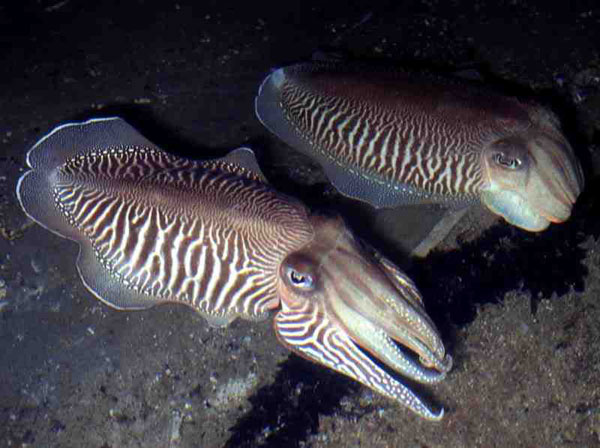Sepia
Sepia officinalis
Origin
Found mainly in the Mediterranean Sea, the preferred habitat of the cuttlefish is near the bottom of waters close to the shore.
Background
In ancient Greece, cuttlefish ink was used medicinally as a treatment for gonorrhea and kidney stones.
Preparation
Cuttlefish ink is dried to a crystalline form and then triturated with lactose sugar.
Common Names
Cuttlefish.
Found mainly in the Mediterranean Sea, the preferred habitat of the cuttlefish is near the bottom of waters close to the shore.
Background
In ancient Greece, cuttlefish ink was used medicinally as a treatment for gonorrhea and kidney stones.
Preparation
Cuttlefish ink is dried to a crystalline form and then triturated with lactose sugar.
Common Names
Cuttlefish.

CUTTLEFISH
Related to the octopus and squid, this mollusk camouflages itself by changing color and protects itself by squirting its brownish black ink when threatened.
Key Symptoms
chilliness • weepiness • irritability • indifference • aversion to sexual intercourse • craving for sour foods- Cuttlefish ink, also known as sepia, is used to make a dark brown pigment traditionally used by painters and printers. In 1834 Hahnemann proved the homeopathic remedy, after observing the apathy and depression experienced by an artist friend who frequently licked his sepia-soaked paintbrush while painting. Sepia is predominantly prescribed to treat women's health problems, especially during or before menstrual periods, or throughout menopause.
Remedy Profile
Sepia is best suited to people who are irritable with loved ones but extroverted in company. They often appear opinionated, detached, and hard, detesting sympathy and disguising their vulnerability. There is typically a sense of sagging or drooping. Despite weepiness, crying does not bring relief.These individuals typically prefer sour foods and drinks, sweet foods, and alcohol, but dislike milk and pork.
Sepia is chiefly linked with the vagina, uterus, and ovaries. It is used for menopause, premenstrual syndrome (PMS), and some pregnancy-related ailments. Indigestion may also be helped, as may headaches, catarrh, discolored, itchy skin, and circulatory problems.
Women's health
Symptoms: Sepia may be used for hormone imbalances linked to PMS, and for thrush, heavy, painful menstruation, and menopause. Typical symptoms may include a dislike of being touched, particularly before menstruation, during menopause, or if there are associated emotional problems. Before, during, and after pregnancy, emotional and physical ailments such as nausea and fatigue may be helped by the remedy. Sexual intercourse may seem painful, prompting an aversion to it. There may be intense abdominal pressure and stress incontinence on laughing or coughing, which may be an indicator of a prolapsed uterus.Symptoms better: For fresh air; for exercise; for crossing the legs; for being occupied; for sleep; for eating.
Symptoms worse: In the early morning; in the early evening; for thundery weather; for lying on the left side; for fatigue.
Fatigue
Symptoms: Emotional and physical exhaustion. The back and sides may ache, and the muscles may feel weak.Symptoms better: For warmth; for fresh air; for sleep; for being occupied; for vigorous exercise.
Symptoms worse: In the early morning; in the early evening; for thundery weather; before menstruation.
Digestive disorders
Symptoms: Indigestion and flatulence, with an abdomen that feels tender and empty, even after eating. There may be constipation, with a feeling as if a lump is in the rectum. Vomiting and nausea may also occur, notably in pregnancy.Symptoms better: For warmth; for vigorous exercise; for sleep.
Symptoms worse: For fatigue; for lying on the left side.
Headaches
Symptoms: Headaches that are particularly prevalent on the left side, possibly with nausea, dizziness, and hair loss.Symptoms better: For warmth; for being in fresh air; for sleep; for eating.
Symptoms worse: In the early morning; in the early evening; for lying on the left side; before menstruation.
Catarrh
Symptoms: Salty-tasting catarrh caused by an allergy or cold accompanied by a cough.Symptoms better: For warmth; for fresh air; for sitting up.
Symptoms worse: At night; during sleep.
Skin conditions
Symptoms: Discolored, itchy patches, and a yellowy brown "saddle," or chloasma, across the nose and cheeks, especially during pregnancy.Symptoms better: For fresh air.
Symptoms worse: Before menstruation; in pregnancy.
Poor circulation
Symptoms: Varicose veins, or hot and cold flashes, especially during menopause.Symptoms better: For fresh air; for exercise; for eating.
Symptoms worse: In the early morning; in the early evening; before menstruation; during menopause.
© 2024 KnowHomeopathy | All rights reserved